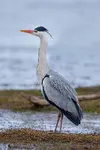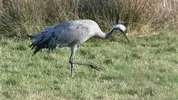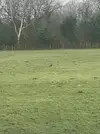I worked nightshifts up to fairly recently and was able to observe these at close quarters, beautiful, majestic birds, literally like a large butterfly able to hover whilst remaining absolutely silent, we should be doing what we can to encourage and protect these or for that matter any owl, they are seen far to rarely these days.View attachment 117500
Not the best photo, as it was taken at twilight on a phone yesterday and passed onto me by my mate, another rarity, but my favourite bird, the Barn Owl.
Taken on the field at Speke Hall.
You are using an out of date browser. It may not display this or other websites correctly.
You should upgrade or use an alternative browser.
You should upgrade or use an alternative browser.
Wildlife in your Garden
- Thread starter Eggs
- Start date
I worked nightshifts up to fairly recently and was able to observe these at close quarters, beautiful, majestic birds, literally like a large butterfly able to hover whilst remaining absolutely silent, we should be doing what we can to encourage and protect these or for that matter any owl, they are seen far to rarely these days.
There’s three pairs in the Speke and Hale area.
All three nest in barns and are looked after by very protective farmers.
Most years they fledge chicks, but the chicks have to leave the area, as there isn’t enough room to sustain another pair - food / territory.
The three pairs in Speke / Hale have been there for decades, but that’s it, it will always remain as three pairs.
My mate lives in East York’s and they’re almost common there, as there was a big push on nest boxes a while back.
Habitat loss, loss of nest sites ( barn conversions ) climate change ( wetter ) and getting killed on the road are what’s doing them in.
JimmyJeffers
Player Valuation: £80m
Poisoning of rats and mice kills a fair few as well.There’s three pairs in the Speke and Hale area.
All three nest in barns and are looked after by very protective farmers.
Most years they fledge chicks, but the chicks have to leave the area, as there isn’t enough room to sustain another pair - food / territory.
The three pairs in Speke / Hale have been there for decades, but that’s it, it will always remain as three pairs.
My mate lives in East York’s and they’re almost common there, as there was a big push on nest boxes a while back.
Habitat loss, loss of nest sites ( barn conversions ) climate change ( wetter ) and getting killed on the road are what’s doing them in.
....seen two different types of small hawks on the garden fence outside my living room window this week. They are stunning, wonder if lockdown is making them more plentiful.
A few weeks ago there was a wading bird (crane I think) on a chimney at the back and the magpies were swooping on it. Neighbours were out chasing them.

Did it look like this ?
If so it was a Heron.

This is a common Crane. They are here, but in very very small numbers - recent introduction from Europe.
Massive birds too.
.
 but you just never know what you're going to see.
but you just never know what you're going to see.
Would be rare to see a crane around here though.
Much more likely than a crane I reckonDid it look like this ?
If so it was a Heron.
 but you just never know what you're going to see.
but you just never know what you're going to see.Would be rare to see a crane around here though.
.
Much more likely than a crane I reckonbut you just never know what you're going to see.
Would be rare to see a crane around here though.
South and the East mainly
Think most are migrants, with one breeding pair.
Copied from RSPB site -South and the East mainly
Think most are migrants, with one breeding pair.
The crane is a huge, graceful, mainly grey bird with long legs, a long neck and drooping, curved tail feathers. There is a small breeding population in Norfolk, a re-introduced population in Somerset and small numbers pass through Britain in spring and autumn.
Simon Buttle
Player Valuation: £60m
I think there are some introduced Cranes over in Norfolk somewhere. There are lot's of Herons though, down where I am in Sussex there is a whole posse of them that live on the Chichester canal and they hover about the fisherman, they are a big old bird no doubt about it..
Much more likely than a crane I reckonbut you just never know what you're going to see.
Would be rare to see a crane around here though.
Sat on my laptop looking at the Coronavirus thread and occasionally glancing into the garden
Tits everywhere
Tits everywhere
I bet there are more in the Coronavirus thread than your gardenSat on my laptop looking at the Coronavirus thread and occasionally glancing into the garden
Tits everywhere

I bet there are more in the Coronavirus thread than your garden
TangerineToffee
Player Valuation: £10m
Not in the same class as wood pigeons in the detestability stakes.I detest magpies wit a passion, horrible destructive pests.
Not in the same class as wood pigeons in the detestability stakes.
If you’re a farmer or have an orchard, I’d agree, but in the city Magpies are brutal predators.
A while ago, a pair by us went through a colony of Linnets nests in a matter of hours. Systematically going from thicket to thicket looking for nests and then eating every single egg / chick that they found.
It’s not their fault that they’ve taken advantage and adapted to suburban environments in particular, but the reality is that just like Wood Pigeons in certain areas, their numbers need to be controlled - same with Grey Squirrels.










